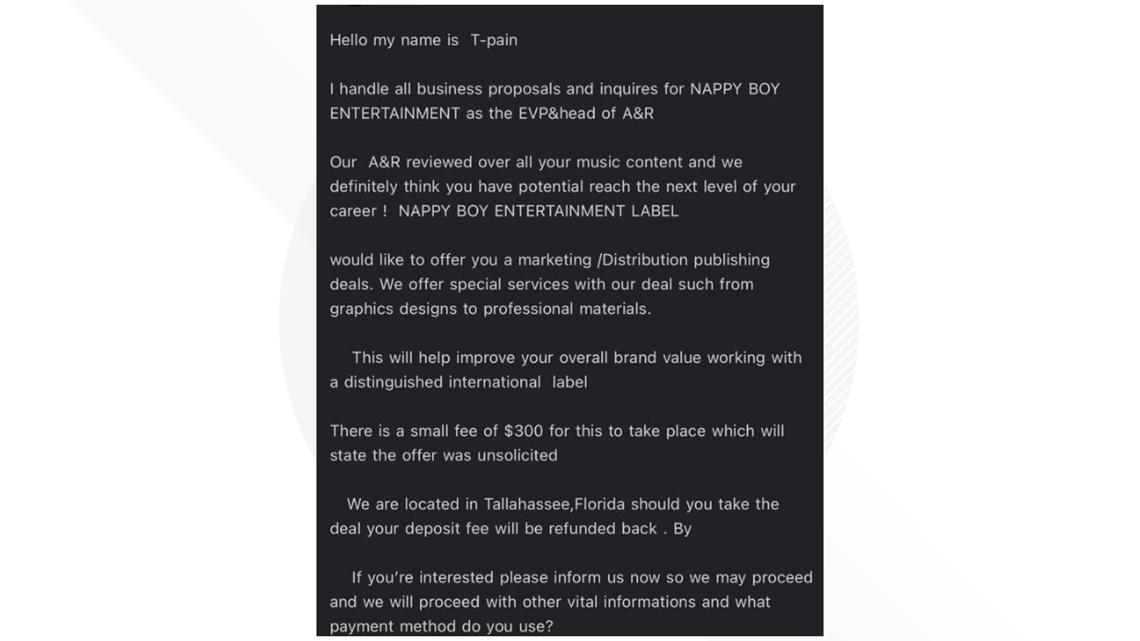KNOXVILLE, Tenn. — Some scammers are trying to lure in victims with an elaborate scheme making folks believe they finally got their big break.
A major online casting company, Backstage, is warning about "casting scams." They said the scams are an unfortunate, but very real, aspect of the online casting process. Victims find themselves seduced by the promise of a dream career job. The company warns that as scammers become more sophisticated in their tactics, it’s important for actors and aspiring actors to stay vigilant.
On Monday, rap artist T-Pain posted on Instagram to warn fans about a scammer using his name to steal people's dreams, and money.


Greg Knox, an actor in Knoxville, said he has landed roles in movies like "Homestead" and "Dog Ears" with Burt Reynolds and Chevy Chase. In all his years of acting, he said he’s gotten a lot of casting call emails. He said some of the ones lately are blatant scams.
"A lot of people will try to scam actors that are looking for a big role, especially if they throw in big-name actors and stuff like that," Knox said. "Will Smith was going to be in it, they were going to put me up in a hotel, pay for travel — you know, all this stuff.”
He said one clear indication an email is a scam is if they skip straight to talking about money, ignoring other parts of the casting process.
"You should usually hear back within a week to a few weeks after your audition, and even then there still might be some time before they get to the payment information," Knox said.
When accepting a role, actors are technically accepting a job offer. Knox said scammers try to trick them into thinking they know who they are and that they're getting a paycheck.
"Because they do direct deposit or they'll do check," Knox said. “But that happens several weeks into the process. It never happens the first day you’ve been asked to audition.”
Tony Binkley, the president of the Better Business Bureau, said a casting call email scam can happen to anyone.
"Sometimes they may mail you a check and have you deposit that check and say, 'Hey, we've sent you too much, send us some back .' Well, that check is never going to be any good and what you're going to be sending back is your own money," Binkley said.
He also said even people who aren't professional actors can be targets of this email scam.
"''It's my big shot, I can be famous, I can be TV.' It's just like anything, you have to temper those expectations," he said.
Backstage has ways for aspiring actors to tell the difference between a legitimate casting call and a fake casting notice. They are listed below.
- Bad grammar: The majority of casting scams are from foreign individuals with a limited command of English and entertainment-industry terminology. These scammers may also use nonsensical job titles and obviously fake names (e.g., "Jimmy Freelancer"), etc.
- Strange email addresses: It’s also common for scammers to write out their email addresses in odd ways, using spaces, parentheses, brackets, or other special characters. For instance, they might format their email address like casting [@] example [dot] com. Beware of any casting calls using that technique.
- Prepayment: No legitimate project will offer to pay you upfront before you've actually done any work for them. Scammers, however, will frequently offer to pay upfront—although you'll never get any real money from them—or try and trick you into revealing your banking details.
- Casting without an audition: Although some real projects will also cast actors online without meeting them first, it's more common among scammers to claim they want to hire you without even meeting you first.
- No locations: Casting scams will often say they're “shooting near you” without being specific about the state where the project is taking place. Or they'll even change the state to match your location if you tell them that you've moved.
- Unexpected fees: If an opportunity requires any sort of legitimate payment from you to participate (e.g., a membership fee to join a community theater or an entry fee to enter a talent competition), then the fee requirements should be clearly spelled out in their original listing. If the producers surprise you with fees (or other dubious obligations) that weren’t mentioned in the original casting call, then be wary. This could be a case of a pay-to-play or bait-and-switch scam.
The BBB in Knoxville has a list of local trusted agencies on its website, here.

